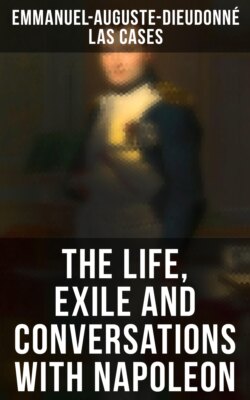Читать книгу The Life, Exile and Conversations with Napoleon - Emmanuel-Auguste-Dieudonné Las Cases - Страница 104
На сайте Литреса книга снята с продажи.
PICTURE OF DOMESTIC HAPPINESS DRAWN BY
THE EMPEROR.—TWO YOUNG LADIES OF THE ISLAND.
ОглавлениеTable of Contents
18th.—The Emperor sent for me about ten o’clock; he had just returned home. Some one had informed me that he had been out shooting; but he said that he had not. He rode out on horseback as early as six o’clock; but he gave orders that His Excellency’s slumbers should not be disturbed. We set to work with the English lesson. Breakfast was served up; it was most detestable; and I could not refrain from making the observation. He pitied me for making so bad a meal, and added that it was certainly necessary to have a good appetite to make a repast on such fare. We continued our lesson until nearly one o’clock, when the excessive heat obliged us to desist, and take a little repose.
About five the Emperor went to walk in the garden. He began to draw a sketch of the happiness of a private man in easy circumstances, peacefully enjoying life in his native province, in the house and surrounded by the lands which he had inherited from his forefathers. Certainly nothing could be more philosophic. We could not refrain from smiling at the tranquil domestic picture, and some of us got our ears pinched for our pains. “Felicity of this kind,” continued the Emperor, “is now unknown in France except by tradition. The Revolution has destroyed it. The old families have been deprived of this happiness, and the new ones have not yet been long enough established in the enjoyment of it. The picture which I have sketched has now no real existence.”—He observed that, to be driven from our native home, from the fields in which we had roamed in childhood, to possess no paternal abode, was in reality to be deprived of a country. Some one here remarked that the man who had been robbed of the home which he had created for himself after the storm had blown over; who was driven from the house in which he had dwelt with his wife, and which had been the birth-place of his children; might truly say that he had lost a second country. How many individuals are reduced to that extremity; and what vicissitudes the present age has produced!
We seated ourselves in the calash, and took our accustomed airing. During dinner, the conversation turned on two young ladies, residents of the island: the one tall, handsome, and very fascinating; the other not so pretty, but perfectly well bred, and pleasing in her deportment and manners. Opinions were divided respecting them. The Emperor, who was only acquainted with the one first described, declared himself in her favour. Some one remarked that, if he were to see the second, he would not be induced to change his mind. The Emperor then wished to know the gentleman’s own opinion respecting the ladies, and he replied, that he was an admirer of the second. This seemed rather contradictory, and the Emperor requested him to explain himself. “Why,” said he, “if I wished to purchase a slave, I should certainly fix on the first; but if I thought I should derive any happiness from becoming a slave myself, I should address myself to the second.”—“That is to say,” resumed the Emperor, quickly, “that you have no very high opinion of my taste?”—“Not so, Sire, but I suspect your Majesty’s views and mine would be different.” The Emperor smiled, and said nothing more on the subject.
19th.—The Emperor rode on horseback very early this morning; it was scarcely six o’clock when he went out. I was quite ready; for I had ordered some one to call me; and the Emperor was astonished to see me so active. We strolled about the park at random, and returned about nine: the sun was already beginning to be warm.
About four o’clock the Emperor wished to take his English lesson; but he was not very well. He said that every thing had gone wrong with him to-day; and that nothing had done him any good. His walk in the garden did not restore him; he was not well at dinner-time. He did not play his usual number of games at chess; but retired, indisposed, after the first game.
